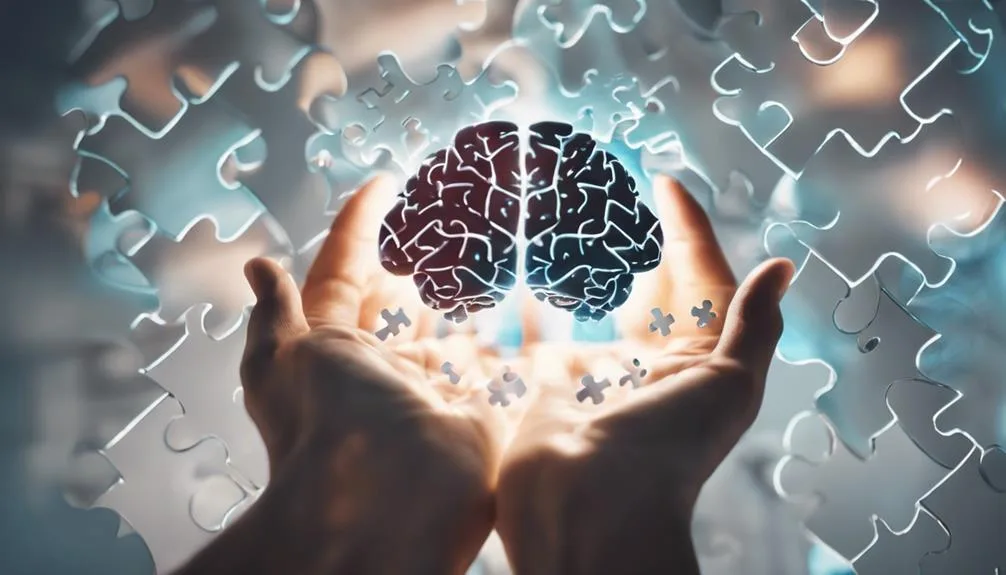In the intricate landscape of mental health, anxiety stands as a pervasive yet often misunderstood condition, weaving its threads through the fabric of countless lives.
'Anxiety Unveiled: Unlocking the Secrets Within' embarks on a scholarly expedition to dissect anxiety's complex nature, aiming to illuminate its causes, manifestations, and the nuanced spectrum of disorders it encompasses.
As we peel back the layers of anxiety's enigmatic cloak, we invite you to join us on this journey of understanding. In doing so, we not only aim to demystify this condition but also to foster a dialogue that paves the way for effective interventions and a deeper empathy towards those it affects.
Key Takeaways
- Anxiety is a natural response that becomes problematic when it disrupts daily life.
- Anxiety disorders are marked by excessive fear, requiring professional management.
- Causes of anxiety include genetic, environmental, and psychological factors.
- Treatment involves therapy, medication, and lifestyle changes, tailored to the individual.
Understanding Anxiety
Grasping the nature of anxiety is essential in recognizing it as more than just a transient feeling of worry; it is a complex condition that affects individuals across a spectrum of intensity and forms. Understanding anxiety's multifaceted character enables the development of effective coping strategies tailored to individual needs.
Among these, mindfulness techniques stand out for their evidence-based efficacy in managing anxiety symptoms. By fostering a moment-to-moment awareness of one's thoughts, feelings, bodily sensations, and surrounding environment, mindfulness helps to interrupt the cycle of worry and fear that characterizes anxiety. This approach promotes a non-judgmental acceptance of one's experience, reducing the intensity of anxious reactions and facilitating a calmer state of mind.
Incorporating such strategies into daily life represents a proactive step towards mitigating the pervasive impact of anxiety.
Anxiety Disorders Explained
Building upon the foundation of understanding anxiety and its management through mindfulness and other strategies, it is crucial to examine the more severe manifestations known as anxiety disorders. These conditions warrant a deeper analysis for better management and coping.
- Anxiety disorders necessitate a multifaceted approach for managing symptoms effectively, incorporating both pharmacological and psychological interventions.
- Tailored coping strategies are essential, varying significantly from person to person based on their unique experiences and symptomatology.
- Cognitive-behavioral therapy (CBT) stands out as a highly effective treatment, focusing on altering negative thought patterns.
- Support groups and mindfulness practices offer additional layers of support, facilitating a sense of community and self-awareness.
Empathy and evidence-based approaches are vital in helping individuals navigate the complexities of anxiety disorders, promoting resilience and well-being.
Causes and Impact

To effectively address the pervasive issue of anxiety, it is imperative to examine the multifaceted causes and their profound impact on individuals' lives. Anxiety is not a monolithic condition; it stems from a complex interplay of factors, including genetic predisposition, which suggests a hereditary component in the vulnerability to anxiety disorders.
This biological underpinning, combined with environmental stressors, can exacerbate the condition, highlighting the importance of understanding one's family medical history. Moreover, the psychological implications of anxiety are significant, affecting cognitive processes, emotional regulation, and behavioral responses.
The impact of anxiety on daily functioning can be debilitating, leading to a decreased quality of life, social withdrawal, and a heightened risk for comorbid mental health conditions. Recognizing these causes and impacts is crucial for effective intervention and support.
Types of Anxiety Disorders
Within the realm of mental health, anxiety disorders encompass a variety of conditions, each characterized by excessive and enduring fear or worry that significantly impairs an individual's functioning. These disorders manifest uniquely, demanding tailored approaches for management and care.
- Generalized Anxiety Disorder (GAD): Persistent, excessive worry about various aspects of daily life, often anticipating disaster.
- Panic Disorder: Sudden, intense episodes of fear, or panic attacks, which may include physical symptoms like chest pain or shortness of breath.
- Social Anxiety Disorder: Overwhelming worry and self-consciousness about everyday social situations, often rooted in a fear of being judged or embarrassed.
- Obsessive-Compulsive Disorder (OCD): Characterized by unwanted, repeated thoughts (obsessions) and/or actions (compulsions), ranging from phobia management to ritualistic behaviors aimed at reducing anxiety.
Understanding these disorders is crucial for effective intervention, emphasizing empathy, evidence-based strategies, and a deep comprehension of individual experiences with social fears and obsessive patterns.
Seeking Help and Treatment

Acknowledging the need for help is a crucial first step for individuals grappling with anxiety, opening the door to a range of therapeutic options and support systems tailored to their unique circumstances. Delving into the myriad of therapy options and coping strategies can seem daunting, but evidence-based approaches provide a beacon of hope.
| Therapy Options | Coping Strategies |
|---|---|
| Cognitive Behavioral Therapy (CBT) | Mindfulness and Meditation |
| Psychodynamic Therapy | Regular Physical Exercise |
| Medication (when necessary) | Healthy Eating Habits |
| Exposure Therapy | Establishing a Routine |
| Support Groups | Journaling |
Embracing these avenues not only alleviates symptoms but also empowers individuals to navigate their anxiety with confidence and resilience, fostering a path towards recovery and well-being.
Frequently Asked Questions
How Do Cultural Factors and Societal Expectations Contribute to the Development and Perception of Anxiety Disorders?
Cultural factors and societal expectations significantly influence the development and perception of anxiety disorders. Societal norms can pressure individuals, while cultural resilience may either mitigate or exacerbate these effects, impacting both recognition and management of anxiety.
Can Anxiety Disorders Emerge Later in Life, or Are They Primarily Developed During Childhood and Adolescence?
Anxiety disorders can indeed manifest later in life, influenced by genetic predisposition and hormonal changes. This underscores the complex interplay between biology and life experiences, emphasizing the importance of understanding anxiety's multifaceted nature.
How Does the Portrayal of Anxiety in Media and Entertainment Impact Public Understanding and Stigma Surrounding Anxiety Disorders?
The portrayal of anxiety in media influences public perceptions and stigma, where accurate character representation and media responsibility are crucial. Misrepresentation can perpetuate misconceptions, while responsible portrayals foster empathy and understanding of anxiety disorders.
In What Ways Can Technology and Social Media Use Exacerbate or Alleviate Symptoms of Anxiety Disorders?
Technology and social media can both exacerbate and alleviate anxiety disorders. Excessive use may require a digital detox, while mindfulness apps offer therapeutic benefits, promoting relaxation and reducing symptoms through guided meditation and breathing exercises.
What Are the Long-Term Effects of Untreated Anxiety Disorders on Cognitive Functions and Aging?
Untreated anxiety disorders can lead to long-term cognitive effects, including accelerated brain aging and memory impairment. It is crucial to address these conditions early to mitigate their impact on cognitive functions and aging processes.
Conclusion
In conclusion, anxiety, though a natural part of the human condition, can spiral out of control, casting a long shadow over the lives of those it affects. Understanding its roots, recognizing its many faces, and seeking appropriate treatment can illuminate the path to recovery.
As the saying goes, knowledge is power. Armed with insights into anxiety's complex nature, individuals can navigate the turbulent waters of mental health with resilience, heading towards a horizon of well-being and peace.

